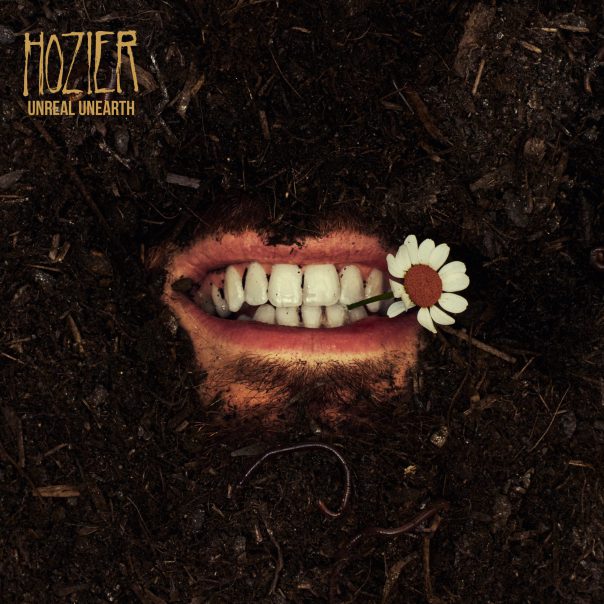ALBUM REVIEW: Hozier goes from darkness to light on ‘Unreal Unearth’

Hozier, “Unreal Unearth.”
Hozier has a style and artistry that seems to exist almost outside of time. While the Irish singer-songwriter draws on influences from folk, gospel and R&B, his sound is distinctly his own.
Unreal Unearth
Hozier
Columbia, Aug. 18
8/10
Get the album on Amazon Music.
His music is epic and grandiose, referencing mythology and classic literature, while also painfully intimate. His expressive voice is immediately recognizable after just a few notes. Hozier’s music is full of passionate vocals, soaring guitar, heartbreaking string arrangements and heartrending lyrics. On his latest album, Unreal Unearth, he doesn’t radically depart from his past sound, but rather, leans into what he was brewing with 2019’s Wasteland, Baby.
Dante’s “Inferno” is a loose theme for most of Unreal Unearth. While it doesn’t match up exactly, the structure of descending into darkness and being led out at the end is the key to the album. The artist, born Andrew Hozier-Byrne, has always been impressively literate in his lyrics, and Unreal Unearth is no exception.
The two songs that open the album, “De Selby” (Parts 1 and 2), are named after a character from dark comedic novel “The Third Policeman.” While unrelated to “Inferno,” they begin immersing you in Unreal Unearth. The first creates ambience with acoustic guitar and strings. Hozier’s singing goes from English to Gaelic, joined by a chorus of voices. Part 2 has ominous yet funky bass, as well as synth bleeps and robotic backing vocals.
“I wanna run against the world that’s turning/ I’d move so fast that I’d outpace the dawn/ I wanna be gone,” Hozier sings.
“First Time” corresponds to the first level of hell, which is limbo. Dante meant it as the place for those who are virtuous but not saved. Hozier uses the status of limbo as it relates to an on-and-off relationship.
“Some part of me must have died/ The first time that you called me ‘baby’/ And some part of me came alive/ The first time that you called me ‘baby,’” he sings. Strings shiver beneath a soulful groove of guitar and bass.
The second circle of hell is lust, and for this Hozier offers “Francesca,” named for one half of the doomed lovers sentenced to this circle in “Inferno.” Hozier sings as her lover Paolo, at the end of his life, defiant: “Darling I’d go through it again,” he sings, his voice rising. “And I’d still be surprised I could find you, darling/ In any life/ If I could hold you for a minute/Darling I would do it again.” The song descends into a swirling storm of organ, guitar effects and high backing vocals, before Hozier concludes, “Heaven is not fit to house a love/ Like you and I.”
Representing the circle of gluttony, “Eat Your Young” is a catchy, darkly funny song. It’s an extended, gruesome metaphor for the way future generations are sacrificed by those in power (and possibly a reference to Jonathan Swift’s “A Modest Proposal.”)
“Come and get some/ Skinning the children for a war-drum/ Putting food on the table selling bombs and guns/ It’s quicker and easier to eat your young,” Hozier sings. He’s always had a penchant for social commentary, and “Eat Your Young” slots right in alongside songs like “Take Me to Church” in that respect.
Snaps and falsetto begin “All Things End,” a slow jam about a relationship crumbling. Swooping cellos and violin add to piano and synths as Hozier sings, “And all things end/ All that we intend is scrawled in sand/ And slips right through our hands.” A song in this R&B style would normally be affirming a love, but Hozier deftly upends that sonic expectation by affirming the effort, instead: “just knowing that everything will end/ Should not change our plans when we begin again.” A choir and key change helps the song rise to a striking crescendo.
The album is not over, though, until Hozier has led us out of the dark, into “First Light.” This song carries echoes of Jeff Buckley in its vocals, and in the theatrical drama of the arrangement. Strings and a choir singing “some bright moment comes” gives it a feel similar to Elbow’s “One Day Like This.” You can almost feel the sun bursting through the clouds. “One bright morning changes all things,” Hozier assures us.
Follow Rachel Alm at Twitter.com/thouzenfold and Instagram.com/thousandfold.
